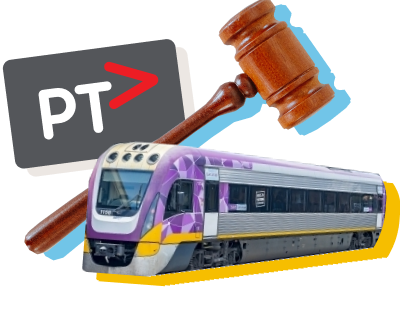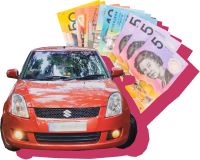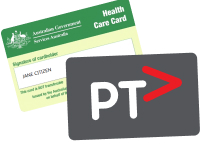Public transport is simple, right? Buy a ticket, jump on, jump off. What’s the problem?
Well, there are ticket inspectors, fines, concession cards, and safety to think about.
It’s easy to think these things aren’t a problem until they happen to you. Get to know your rights (and your responsibilities) so you can travel without a worry.
226 trains
are operated by Metro Trains, transporting 450,000 customers each day across Victoria
Top-up, touch-on, touch-off
The Victorian public transport system relies on you having money (topping up your card) and using the card readers (touching on and off).
If you do these things, you’ll avoid most trouble with authorised officers.
What is an authorised officer?
An authorised officer is sometimes called a ticket inspector. They make sure everyone is travelling with a valid ticket. They also look out for antisocial behaviour to make sure travel is safe for everyone.
Operators of public transport have a legal responsibility to make sure that everyone who uses their services is treated fairly and with respect.
Concession cards
If you’re over 17 (or under 17 and have a student pass), you must have your physical concession card on you at all times.
Public Transport Victoria (PTV) has more information on their website.
Getting a concession card is easy and you can check if you are eligible here.
Concession cards expire every year, so it is important to keep them up to date.
If you don’t have your concession card when asked by an authorised officer, you can be fined up to $81 if you’re under 18. If you’re over 18, you can pay up to $242.
Interacting with ticket authorised officers
Authorised officers are people hired by the transport system to make sure that everyone is travelling legally and paying the correct fares.
If an authorised officer stops you, it’s important to stay calm and be honest with them.
You might start to feel stressed or anxious, but if you start to verbally abuse or threaten them, they may take further action and even call the police.
It is against the law for someone to treat you unfairly when you are using a transport service because of a personal characteristic such as your disability, race, religion, sex, or sexual orientation.
Tips for talking to an authorised officer
- Don’t swear, raise your voice or be verbally abusive
- Ask them to clearly explain what they need from you
- If English is not your first language, ask them to be clearer or ask someone around you to help
- It is okay to stand up for yourself if you feel that they are being unfair, discriminating against you or bullying you. But try to remain calm and explain clearly what your rights are
- If you feel like they are just approaching you based on race, sexuality, ethnicity or what you are wearing for example, you can lodge a complaint here
Authorised officers can fine you for:
- Having your feet on seats
- Leaving rubbish
- Damage or graffiti
- Travelling without a concession card concession or a ticket
- Smoking/alcohol or drug use on public transport or at public transport stations or stops
- Antisocial behaviour (yelling, swearing, threatening others, stealing)
- Interfering with the operation of doors or gates
Authorised officers cannot:
- Search you or your things
- Take your stuff if it’s not illegal to have it on public transport
- Take your phone or force you to delete data from it
- Say racist or abusive things
- Use unnecessary force
If an authorised officer tries to give you a fine for something that doesn’t seem quite right to you, you can either ask them for more information or contact PTV after you receive the fine.
Be aware of your rights. Check out what the Victorian Equal Opportunity and Human Rights Commission has to say about transport.
What happens if you get issued a fine
If you are issued with a fine and you feel like it has been issued fairly, it is important you pay it on time and the correct amount (just like any other bill).
Before you pay a fine, you may want to talk to an adult, parent or guardian to explain what happened and get advice on whether the fine was issued fairly.
If you can’t pay on time, you need to contact PTV and let them know.
All the details on how and when to pay will be on the fine as well as contact details if you have any questions.
Transport impacts on every aspect of my life in a rural area, to get to uni, the doctor and even to be able to socialise.
Disputing a fine
If you feel like you have been issued a fine unfairly or can prove that you shouldn’t have received it, you can contact PTV and explain why.
Check out the Victorian Government's page for more information on seeking a review of a fine.
Depending on the circumstances they may consider cancelling your fine or giving you some extra time to pay.
There might be lots of reasons that you want to dispute a fine. If you are ever unsure, contact PTV to find out your options.
I don’t have a driver’s license yet, so reliable and available public transport is very important to me.
Keeping safe on public transport
Public transport is a great way for lots of different people from all sorts of backgrounds to get around at a low cost.
But mixing lots of different people together in a small space can sometimes create some friction.
If you don’t feel safe you can:
- Move to a different seat
- Try not to draw attention to yourself
- Speak to the bus or tram driver
- Press the emergency button on the train
- Get off at the next stop
- Tell the police
You should always call the police if a crime has been committed and let them know what happened, rather than trying to deal with it yourself.
Using rideshare
Rideshare services, where you can book transport via an app, are generally safe and reliable ways to get around.
Keep in mind that although they can be quick and convenient, they are more expensive, and can easily add up financially.
Some ways to ensure you have a safe and easy trip are:
- Check the driver’s ratings/feedback on the app
- Set a pin number for security via the app which the driver will ask you for once you enter the car and before they start the trip. This ensures that you have entered the right vehicle and the driver is who they say they are.
- Double-check the licence plate (the numbers on the plate at the back and front of the outside of the car) and make sure it matches the details of the driver on the app.
- During the trip, you can open the app and watch the trip on maps, which should show where you started and are going.
- Share your trip with friends so they can keep track of where you are if something were to happen.
- If anything happens during the trip that makes you feel unsafe or you are unhappy, you can also make reports via the app to the company or the police.
If you are on your own, and you feel unsafe, the most important thing is to remain calm. If you need to, wait for the right time, and where it is safe for you to exit the vehicle.
Remember:
- Make sure you have money for your fare
- Always carry your physical concession card
- Avoid situations that may create conflict
- Be considerate of other passengers
- Stay calm and be polite to authorised officers if they ask to see your ticket
- Be safe when using public transport or rideshare vehicles

Ready to put your skills into practice?
Get comprehensive guidance on driving and public transport at Youth Central.




